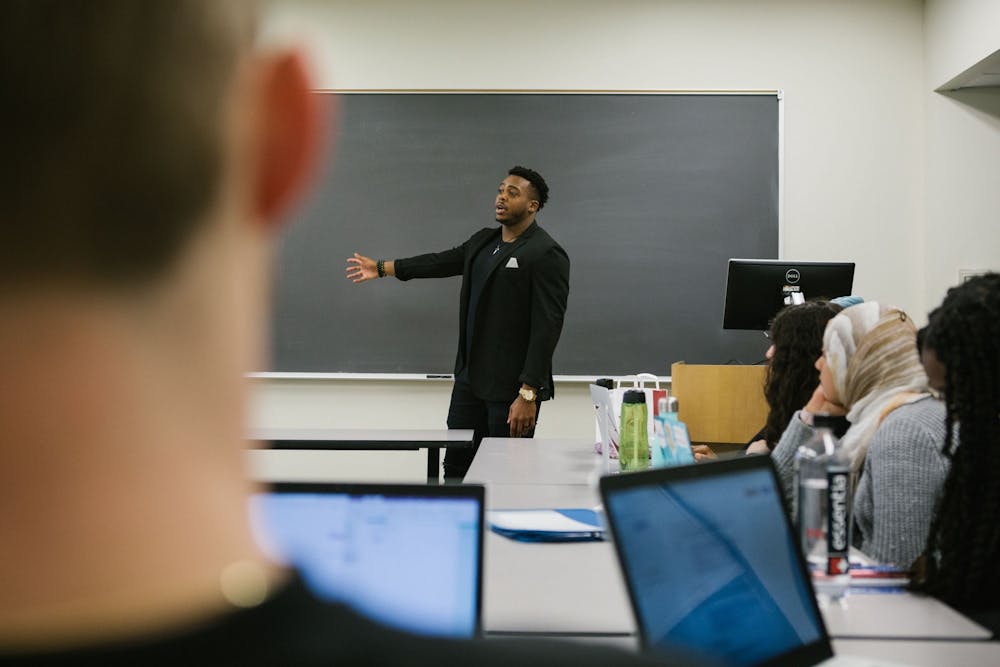Since the NCAA began allowing athletes to benefit from paid partnerships in June 2021, the only thing stopping athletes from monetizing their status is a lack of know-how.
Brandon Copeland, currently a linebacker for the Atlanta Falcons and a former Quaker, recently spoke to Penn student-athletes on his success with monetizing his brand and how an athlete looking to take advantage of these new opportunities can do the same.
Just this year, the NCAA changed its rules regarding endorsement opportunities for college athletes. In the past, student-athletes were not allowed to profit off of their name, image, or likeness (NIL), meaning athletes could not benefit from endorsements, sponsorships, or any sort of paid promotion. With the newest rule change, however, student-athletes at NCAA schools including Penn can use their name, image, and likeness for partnerships with commercial entities, nonprofits or charitable organizations, and self-owned businesses.
Rachel Kuperinsky, assistant athletic director for compliance, understands the ins and outs of the new NIL legislation. One of her roles under the new NIL framework is to ensure Penn’s student-athletes are complying with all regulations, whether they be through the NCAA, the University, or the state of Pennsylvania.
“We have a good portion of our student-athlete body that has taken advantage of NIL opportunities across all 33 varsity sports,” Kuperinsky said.
However, many Penn student-athletes have not yet ventured into the NIL landscape.
“We have received feedback that Penn student-athletes do not feel NIL applies directly to them,” Lauren Procopio, another of Penn’s assistant athletic directors, said.
Penn Athletics is working to combat feelings of uncertainty among athletes and promote participation in NIL activities by hosting a slew of accomplished guest speakers who have experience in brand monetization.
RELATED:
Penn football falls short against Columbia, drops to 0-2 in Ivy League play
Belgrad | Penn football is the real loser in win against Lehigh
“The goal and purpose of our NIL series is to gain clarity on NIL proposals, educate all parties — students, coaches, staff, administrators, et cetera — and prepare for implementation and success,” Procopio said.
Athletes register for Zoom sessions or attend limited-capacity in-person seminars to learn from these guests.
“Our stance has always been to provide student-athletes with all of the tools to succeed ... to make sure that any student-athlete can be successful in this space,” Kuperinsky said.
Copeland spoke to student-athletes on Sept. 28. Since graduating from Wharton, he has received a variety of awards and accolades in the categories of philanthropy and finance, including an appearance on 2021’s Forbes 30 Under 30 list. Copeland is also a nine-year NFL veteran, and has been a part of six different teams.
For years, Copeland has already been sharing his knowledge about financial literacy; he teaches a Penn course about just that, which he calls "Life 101."
Copeland spoke to Penn athletes for nearly 90 minutes, beginning his time by discussing the importance of a strong off-the-field work ethic and entrepreneurial attitude. He then advised athletes on how to safely and successfully engage with NIL opportunities. Copeland took those in attendance through brainstorming activities to get them thinking about possible places on campus that would be willing to put their name behind a student-athlete at Penn.
“I think he was able to approach this topic from an angle of how he would capitalize as a current Penn student-athlete, with the knowledge he has gained from being a professional football athlete,” Procopio said.
Common questions among participants were about how an Ivy League athlete could be desirable to third parties looking to promote their brand. Copeland spoke about how the initial stages of creating a brand often require participation in activities that have no pay. But as an athlete continues to build their reputation, monetized opportunities will begin to arise.
“It was clear from Brandon Copeland’s session that our student-athletes are curious and interested in NIL," Procopio said. "However, we realized that our student-athletes need more education on the marketplaces that are available to them to seek out NIL opportunities."
So far, Penn Athletics has deemed the educational series a success.
“We are seeing a direct increase in NIL activities and disclosures from student-athletes who participate in these NIL educational sessions,” Procopio said.
The NIL educational series will continue throughout the fall. The next session — which will focus on contract negotiation, personal brand protection, and the NIL legal landscape — is on Thursday, Oct. 28 at 6:30 pm, in-person at Tangen Hall. The in-person audience capacity is 25 student-athletes; the presentation will be streamed as well as recorded for the benefit of all athletes looking to maximize their NIL success.









